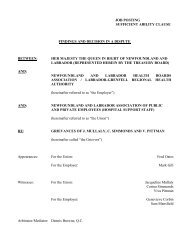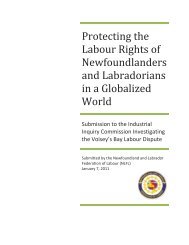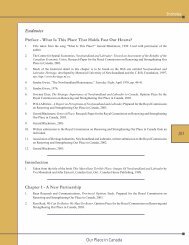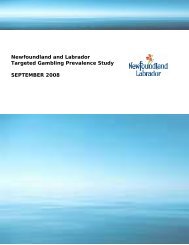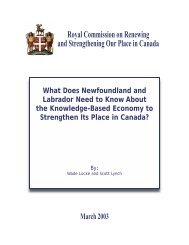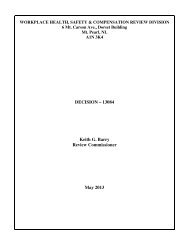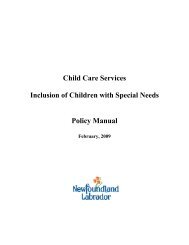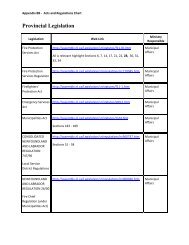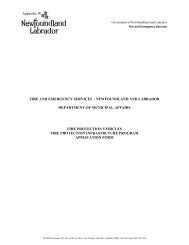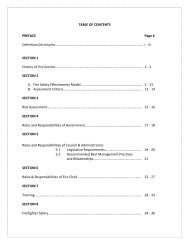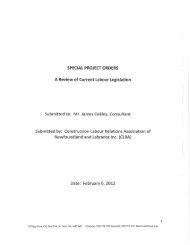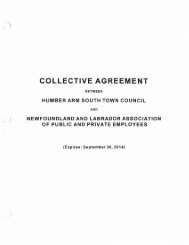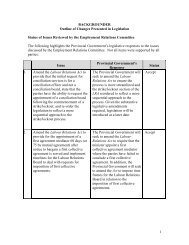Energy Plan - Government of Newfoundland and Labrador
Energy Plan - Government of Newfoundland and Labrador
Energy Plan - Government of Newfoundland and Labrador
You also want an ePaper? Increase the reach of your titles
YUMPU automatically turns print PDFs into web optimized ePapers that Google loves.
It is time for the provincial <strong>and</strong> federal governments to conduct a joint<br />
comprehensive review <strong>and</strong> update the regime. Since 1985, regulatory complexity<br />
<strong>and</strong> overlap has increased significantly, complicating the administration <strong>of</strong><br />
resources in the <strong>of</strong>fshore area. Recent attempts to streamline the efficiency<br />
<strong>of</strong> the regulatory process have generated some positive results, however, this<br />
process has still proven to be complex <strong>and</strong> slow. It is clearly time to update<br />
the framework to ensure that it is efficient <strong>and</strong> effective for the future, applying<br />
the lessons learned over the last 20 years. This modernization will benefit<br />
both the province <strong>and</strong> the Federal <strong>Government</strong> <strong>and</strong> promote development <strong>of</strong><br />
the <strong>of</strong>fshore resources.<br />
L<strong>and</strong> Management<br />
L<strong>and</strong> management refers to the process followed whereby governments provide<br />
the opportunity to oil companies to explore <strong>and</strong> develop l<strong>and</strong>s on which oil<br />
<strong>and</strong> gas potential exists. Effective l<strong>and</strong> management is a key component to<br />
accelerating development <strong>of</strong> oil <strong>and</strong> gas opportunities.<br />
There are three critical periods to consider when designing a l<strong>and</strong> management<br />
system, the exploration phase, the discovery/development phase, <strong>and</strong> the<br />
producing phase.<br />
Onshore, the Provincial <strong>Government</strong> views a competitive, market-driven l<strong>and</strong><br />
management system as a requirement for a healthy petroleum exploration <strong>and</strong><br />
development industry. Ensuring there are no impediments to this will form part<br />
<strong>of</strong> the review <strong>of</strong> our onshore regulatory framework discussed above.<br />
In the <strong>of</strong>fshore, the province proposes to improve the existing exploration phase<br />
process. Currently, companies identify l<strong>and</strong>s they wish to explore <strong>and</strong> nominate<br />
those l<strong>and</strong>s to the C-NLOPB. The C-NLOPB decides which l<strong>and</strong>s will be posted for<br />
bid, depending on the level <strong>of</strong> interest expressed. Following posting, companies<br />
“bid” on the l<strong>and</strong>s by <strong>of</strong>fering to spend a specific amount on seismic <strong>and</strong>/or<br />
drilling activity. If an Exploration License is awarded, the company then has five<br />
years (extendable to nine years if an acceptable plan is agreed to) to expend<br />
the bid amount. If the bid amount is not fully expended, <strong>and</strong> a significant<br />
discovery has not occurred, the companies must return the exploration rights<br />
plus the C-NLOPB retains 25 per cent <strong>of</strong> the unexpended commitment. The<br />
province proposes to improve this phase by ensuring companies outline detailed<br />
plans <strong>and</strong> timelines for execution for exploration activity, <strong>and</strong> to establish a<br />
reporting <strong>and</strong> monitoring program which will ensure the activity is being pursued<br />
as planned.<br />
If exploration yields a significant discovery, the discovery/development phase is<br />
entered <strong>and</strong> the company applies for a Significant Development License (SDL),<br />
which requires special attention <strong>and</strong> substantive revision. Under the existing<br />
Atlantic Accord regulatory regime, these SDLs do not expire, allowing companies<br />
to hold their discoveries without developing them. Therefore, the timing <strong>of</strong> the<br />
development <strong>of</strong> these discoveries is left solely to the discretion <strong>of</strong> the company<br />
holding the SDL; neither governments nor other interested parties have effective<br />
means to either force development or to have the property released to be<br />
available for acquisition by other interested parties.<br />
POLICY<br />
ACTIONS<br />
Regulatory Framework<br />
The <strong>Government</strong> <strong>of</strong><br />
<strong>Newfoundl<strong>and</strong></strong> <strong>and</strong> <strong>Labrador</strong> will:<br />
• Review the onshore<br />
petroleum regulatory<br />
structure to ensure it<br />
responds to the needs <strong>of</strong><br />
industry <strong>and</strong> the province.<br />
• Continue to work with the<br />
Federal <strong>Government</strong> <strong>and</strong><br />
stakeholders to improve the<br />
efficiency <strong>and</strong> effectiveness<br />
<strong>of</strong> our current <strong>of</strong>fshore<br />
regulatory structure,<br />
consistent with the principles<br />
<strong>of</strong> the Atlantic Accord.<br />
• Work with the affected<br />
Aboriginal governments<br />
<strong>and</strong> groups to ensure that<br />
developments in areas under<br />
claim or subject to a treaty<br />
are managed efficiently <strong>and</strong><br />
effectively for the benefit<br />
<strong>of</strong> those Aboriginal peoples<br />
<strong>and</strong> other residents <strong>of</strong> the<br />
province.<br />
23



